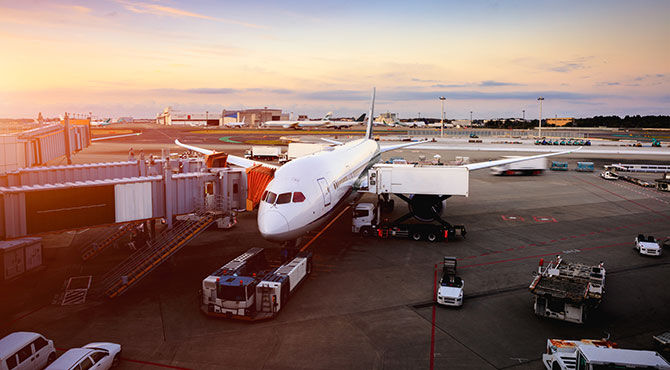UK inflation returns to a downward path
A reduction in airfares is among one of the key reasons for a drop in the CPI from November to December, according to the latest data from the Office for National Statistics.

 16 January 2018
16 January 2018CPI starts moving towards government targets
Data from the Office for National Statistics (ONS) showed that a drop in air fares and a levelling off of price increases on clothes and toys helped the consumer price index (CPI) fall to three per in December, down from 3.1 per cent in November.The drop was in line with analysts’ expectations, with the Bank of England forecasting a steady fall in the rate throughout 2018, eventually reaching the government’s annual target of two per cent.Nevertheless, the UK rate compares unfavourably with that in the eurozone, where the CPI is currently increasing at only 1.4 per cent.Weakened pound boosts inflation
James Tucker, ONS senior statistician, said, “Inflation has been running at roughly the same rate since last spring following significant increases, partly due to the weaker pound after the European referendum.“It remains too early to say whether today’s slight fall is the start of any longer-term reduction in the rate of inflation.”Suren Thiru, head of economics at the British Chambers of Commerce, said, “Inflation has eased for the first time since June 2017, with air fares placing the largest downward pressure on price growth in December.“It’s probable that inflation is on a downward trajectory, as the impact of the post-EU referendum slide in sterling starts to fade. However, our own survey data suggests that the substantial increases in the cost of raw materials over the past year are still passing through supply chains, and therefore progress back to the Bank of England’s two per cent target is likely to be painfully slow.“As a consequence, the cost pressures on both consumers and business is set to remain sizable over the near term, and together with faltering confidence levels, is likely to stifle overall economic activity.“With inflation likely to remain above target for some time, the prospect of further rises in interest rates remains very much on the table. However, with economic conditions in the UK likely to weaken further, the most preferential option would be for the (Bank of England’s Monetary Policy Committee) to opt for a prolonged period of monetary stability and to keep interest rates steady over the near term. More also needs to be done to tackle the high upfront cost of doing business in the UK, including fundamental reform of the UK’s business rates system.”Related stories:
- May pledges to make Brexit priority of financial services
- Surge in manufacturing leads to GDP growth upgrade
- Productivity boost ‘a small step when giant leap needed’
Paul Hollingsworth, senior UK economist at Capital Economics, said he expected the reduction in inflation to mark the beginning of a sustained downward trend over the course of this year.“December’s rate was in line with the consensus expectation, with the breakdown showing that a rise in fuel prices, reflecting the recent rise in oil prices, and tobacco prices, reflecting the duty changes announced in the Autumn Statement, was offset by a smaller contribution from air fares inflation,” he said.“Meanwhile, the producer prices figures showed input price inflation fell sharply, from 7.3 per cent in November to 4.9 per cent, suggesting that price pressures at the beginning of the production pipeline are continuing to cool.”Richard Lim, chief executive of Retail Economics, commented, “The good news is that inflation appears to have peaked. We expect inflation to fall fairly sharply, to around 2.5 per cent by spring, which will ease the pressure on household budgets.“That said, food inflation remains near four-year high and petrol prices rose sharply as the continued impact of Brexit and rising commodity prices fed through supply chains.”
Inflation begins stabilising
Lucy O’Carroll, chief economist at Aberdeen Standard Investments, said, “Today’s headline number doesn’t amount to a hill of beans in isolation. But it’s more interesting in the context of what’s been happening with inflation lately.“It appears to be steadying around three per cent and could stay close to this level for the next few months. Looking a little further into 2018, inflation is likely to drift down gradually as the rise in prices caused by the pound’s decline falls out of the numbers.“This slowing in inflation takes the pressure off the Bank of England to raise rates in the short term. What matters most for the long-term health of the UK economy is improving its productivity performance.”
For related news and features, visit our Enterprise section. Look out for the launch of 2018’s Relocate Awards, entry is now open. Relocate’s new Global Mobility Toolkit provides free information, practical advice and support for HR, global mobility managers and global teams operating overseas.
 Access hundreds of global services and suppliers in our Online Directory
Access hundreds of global services and suppliers in our Online Directory
©2026 Re:locate magazine, published by Profile Locations, Spray Hill, Hastings Road, Lamberhurst, Kent TN3 8JB. All rights reserved. This publication (or any part thereof) may not be reproduced in any form without the prior written permission of Profile Locations. Profile Locations accepts no liability for the accuracy of the contents or any opinions expressed herein.






























